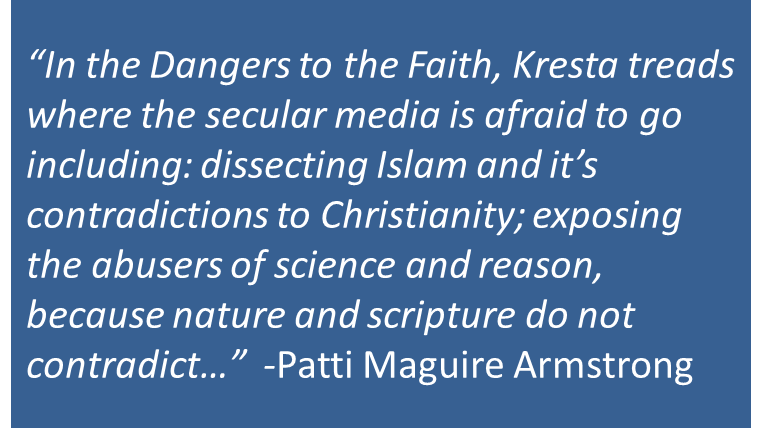Dangers to the Faith
It is holy to love our enemy, but we must recognize him. The guy who takes our parking spot, the cranky neighbor, the difficult in-law…they are not the ultimate enemy. Yes, they are personal challenges, but they are also opportunities for grace—“The measure with which you measure, will be measured back to you” (Luke 6:38).
The ultimate enemy is the darkness that siphons off Godly values and rejects Christianity as silly or even dangerous to an indulgent society. We are called to love the misguided ones who fall for the clever disguises of darkness. By knowing the truths of our faith, we can shed light on the darkness and redirect them.
In his new book, Dangers to the Faith: Recognizing Catholicism’s 21st-Century Opponents, Al Kresta shines a spotlight upon our culture. The President and CEO of Ave Maria Radio, and host of “Kresta in the Afternoon,” takes on our feel-good, self-empowerment world and challenges every Catholic not to just live their faith, but to defeat the enemy through our examples and defense of the truth.
“Baptism identifies every Catholic with the mission of Christ,” he writes. “The question isn’t whether or not we are involved in the mission of the Church. Baptism has already involved us.”
“Jesus said, we would have tribulation, but be of good cheer for he has overcome the world,” Kresta writes. “Our aim is not separation from the world, nor accommodation to the world but rather, to the degree that God gives us the grace, transformation of the world to resemble the Kingdom.”
The challenge is that much of the world presents an easier, more enlightened way that tramples on God’s truth. There lies our challenge because so many are following the Pied Piper of false enlightenment into darkness. Kresta tells us that Christ sent us into the world to imitate him so we must take our cues from a Kingdom not of this world.
The first enemy Kresta takes on in his book is “New Age,” as well as a mix-and-match spirituality. “Oprah cheerleads this individualistic, eclectic spirituality which challenges and, for many, replaces the more traditional denominations,” he writes. “Thirty-three percent of people polled say Oprah has ‘a more profound impact’ on their spirituality than their pastors.” Kresta warns that the problem is the misconceptions about the faith she promotes thinking she’s helping people.
New Age spirituality is about human potential, self-improvement, and success motivation. Kresta explains that the New Age movement has evolved into a quasi-science that rests on claims of mesmerism, spiritualism and animal magnetism. An example is the claim that the human mind receives and transmits vibrations that influences the environment so that positive thoughts can change physical reality. A popular mantra is, “What you conceive and believe, you will achieve and receive.”
The purported “Law of Attraction” also exaggerates our control over life, claiming that we are creators of our own reality. Kresta counters with God’s truth. “The Scripture presents a very different sovereign,” He writes. “Many are the plans in the mind of a man, but it is the purpose of the LORD that will be established.”
New Age, according to him, tells the same old lie told in the Garden of Eden, that rather than relying on God, man can discover his own divinity. Or as New Age enthusiast Shirley MacLaine puts it: “Know that you are God; know that you are the universe.”
Kresta counters with the words of St. Paul, “I can do all things through Christ who strengthens me.” (Phil 4:13). He writes, “For Christians, it is not me vs. Christ, but Christ in me, the hope of glory. The source of our strength comes from another. He indwells us, but doesn’t displace us.”
In the Dangers to the Faith, Kresta treads where the secular media is afraid to go including: dissecting Islam and it’s contradictions to Christianity; exposing the abusers of science and reason, because nature and scripture do not contradict; and the irrationality of relativism since we are an inescapably moral people yet the secular culture dictates which moral concerns are acceptable. He even takes on consumerism, a part of the Western lifestyle many fail to recognize arrests our development by continually weakening impulse control.
Kresta’s book shows the superiority of God’s absolute law over false teachings and temptations. Biblical principals are brought to bear to show the glory of the cross over the veneer of a make-believe world. Kresta offers us no promises or easy fixes in life but rather that of the ultimate fix: a life full of value based on Jesus in the Eucharist.
“Catholic teaching best corresponds to life as we experience it,” Kresta writes. “It best explains human aspirations for love, life, significance, and meaning, the appearance of design in the cosmos, the function of conscience, the rise of modern science, the persistence of the Jews and the papacy, the rise of the Christian Church and a God who reveals himself as Love, is Infinite and Personal, who is both one and many and who we are called upon to image.”
About the Author: Patti Maguire Armstrong




“Catholic teaching best corresponds to life as we experience it,” Kresta writes. I look forward to reading the book and seeing if this claim, the central claim of Catholicism, is actually defended. It's not obvious to many people that God is indeed present, let alone intervenes to help us. The evidence suggests we are alone in the world. I say this with deep regret, after decades of searching earnestly on a daily basis for the signs of an active, loving God. I just don't feel it, but I'm glad that Mr. Kresta and the millions and millions of others who remain confident--good for them--they've got faith hardwired in their DNA.
ReplyDeleteThis comment has been removed by the author.
ReplyDeleteLook forward to reading it!
ReplyDelete